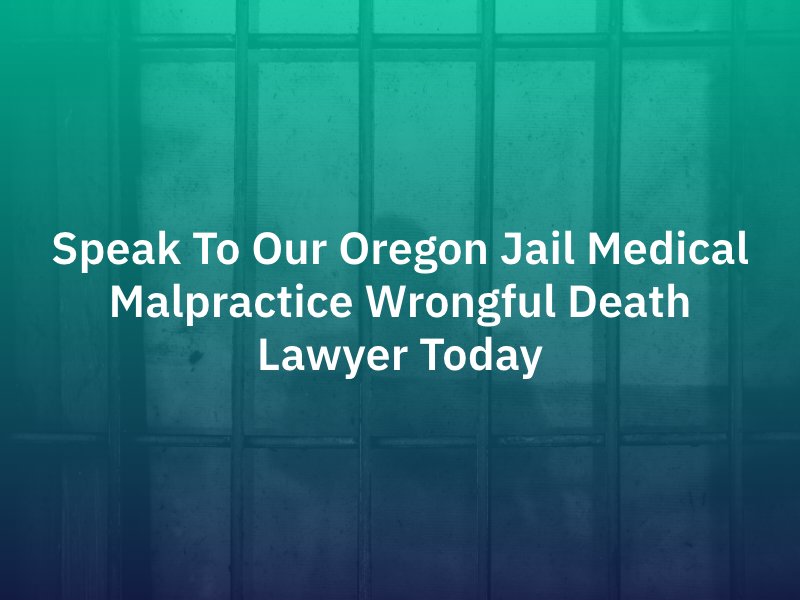Request your Free Consultation
Did your loved one die as a result of negligent medical treatment in jail? As a family or loved one of a person who died while in the care of the legal system, it is critical for you to understand your rights when seeking compensation for that loss. Nothing will bring them back, but holding those responsible accountable can be critically important.
At Paulson Coletti, our Oregon jail wrongful death lawyer is available to discuss your case with you and provide you with actionable steps you can take against those who caused this loss. Call for a free evaluation now.
To immediately access the resources at any point on this page, click the corresponding links below.
Why Choose Our Lawyer?
Do You Need a Jail Wrongful Death Attorney?
What is a Jail Medical Malpractice Wrongful Death Lawsuit?
Medical Issues Leading to Wrongful Death
Consequences of Inadequate Medical Care in Jails
Oregon Jails Must Legally Provide Medical Aid
Call Our Attorney Today

With comprehensive legal services and a passion for providing our clients with outstanding support through this very difficult time, you can depend on Paulson Coletti for exceptional support. We understand how devastating this situation is, as well as how financially damaging it can be as well. When you choose our experienced medical malpractice legal team, you can expect:
Start with a free evaluation of your case. There is nothing to pay us now. Let us help you determine if you have a case.
From a legal perspective, yes, you need an Oregon jail wrongful death lawyer to obtain compensation in these very challenging cases. Any type of lawsuit like this will be faced with critical judgment, but with our experience, we can help our clients push back against improper claims or inaccurate statements. We recognize the sensitivity of these matters.
We also know we are going up against some of the most experienced attorneys. Without this type of hands-on experience helping others with cases like this, it can be very challenging to achieve any compensation.
A wrongful death lawsuit is a legal step towards receiving compensation for the loss of a loved one through negligence. If your loved one is in jail, they may not have the same freedoms as others, but they are entitled to safety, proper medical care, and a healthy living environment. If your loved one dies in a prison, especially unexpectedly, you may have the right to seek recovery for the losses you have sustained, including covering final burial and end-of-life costs.
To prove the wrongful death of an incarcerated person, you must show that the individual did not receive the care they need, what should be expected, and that they died as a result of that lack of care. The details of every case are critical, and our highly experienced jail medical malpractice wrongful death lawyer in Oregon can help you find out if you can file a lawsuit.
Medical malpractice is one of the reasons wrongful death can occur in an Oregon jail. It occurs when the jail does not provide proper care to a person, and that lack of care worsens a person’s health and ultimately leads to their death. The same rules that apply in a traditional hospital setting apply in a jail. A person is entitled to proper medical care, and when a doctor does not follow the standard best practices in providing that care, there is the risk of malpractice occurring.
The following are some common reasons wrongful death can occur in an Oregon jail related specifically to medical care. If your family member suffered from these conditions, speak to our legal team about what occurred:
Our jail wrongful death attorneys have helped people obtain the insight they need in difficult cases. Not every death is negligent, but every negligent death is one that should be treated seriously. We can help.
When an incarcerated person does not receive the medical care they need at any time during their sentence, it can shorten their life expectancy. Some studies report that every year a person spends in a jail reduces their life expectancy, on average, by two years. In mass incarceration settings, the losses are even higher. On average, a person’s life expectancy if they were not in such settings and without incarceration is five years longer.
It is illegal for a person in jail to not receive adequate medical care. This includes:
When a person does not receive the care they need, the jail is negligent. If this leads to a person’s death, they are negligent, and a wrongful death lawsuit may be the most important step you take as an immediate family member.
As your experienced Oregon jail wrongful death lawyer, Paulson Coletti is dedicated to supporting you through this very challenging time. We respect the pain and frustration you are facing right now, and we give you the power and legal support you need to get results.
Seek out a free evaluation with us now. Let us discuss the legal strategy available to help you obtain the compensation owed after the death of your family member in an Oregon jail.